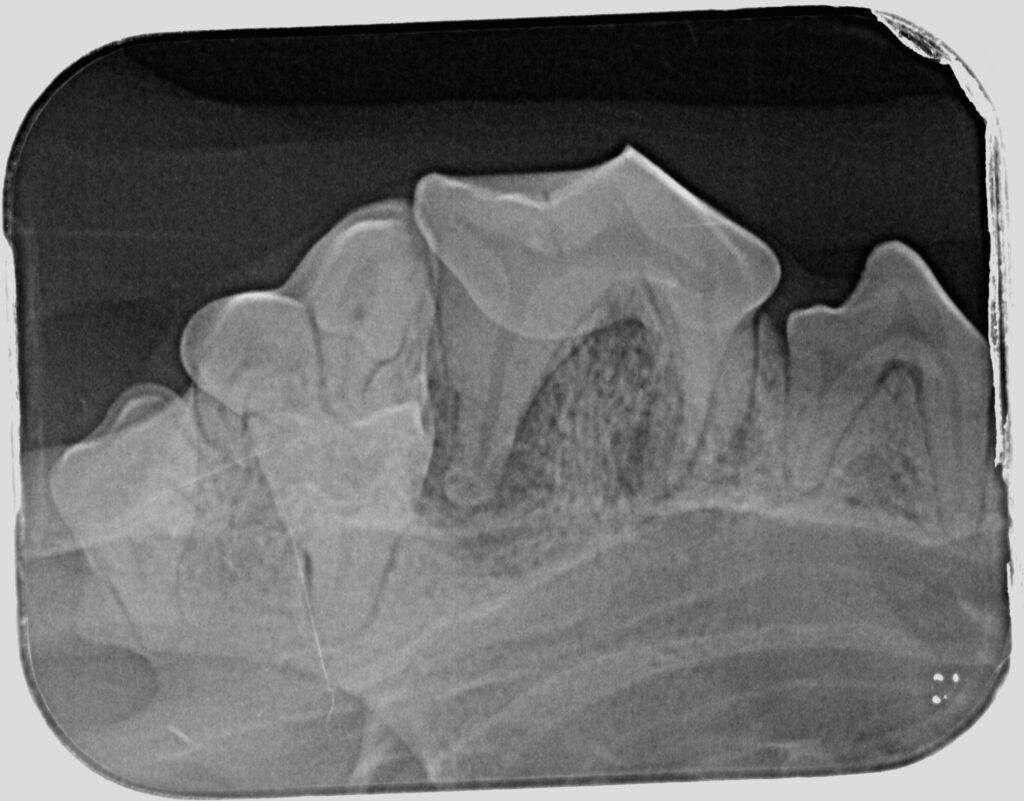Freya is a 3-year-old spayed female Shetland Sheepdog (Sheltie) who was referred to The COVE’s Colleen Fox, DVM, CSAVP Dentistry, for a fractured tooth that became infected. At home, Freya had experienced facial swelling under her left eye, and she was pawing at the area. Freya had a history of chewing on hard items such as nylon bones and antlers, which were the likely culprit of her broken tooth.
Options for fractured teeth with exposed pulp (nerve and blood supply) can be treated by either extraction or root canal therapy. Monitoring these teeth is never an option. After discussing the options at the consultation, Freya’s owner decided to go forward with root canal therapy. Root canal therapy is done under general anesthesia and involves removing the nerve and blood supply to the tooth. This removes the infection, and the tooth is no longer painful. It is a less painful and involved surgery than extraction, and Freya would get to keep her tooth for chewing.

On Freya’s procedure day, she was fully anesthetized, and a full set of dental X-rays were taken. The radiograph of the fractured tooth showed large areas of periapical pathology (bone loss and infection) affecting all three roots. In general, success rates for root canal therapy are around 91%, but in this case, because of periapical pathology, the success rate was lower. Dr. Fox spoke with Freya’s owner and recommended extraction.

Following surgery, Freya was sent home on several days of pain medication, instructed to finish the antibiotic she had already been taking, and was fed a softened diet until her recheck exam. At her recheck exam, she was doing great, and her extraction site had completely healed. Freya will go on to live a healthy, pain-free life, and her owner plans to get rid of the hard chew items to prevent fractures of her other teeth in the future.
Unfortunately, almost all stores that carry pet products also sell products that are too hard for pets to chew on and can break their teeth. A few of these products include nylon bones, antlers, bully sticks, hooves, real bones, and many more. Even compressed rawhides can break teeth.
One tip to tell if an item is too hard to chew on is to try to break it with your hands or indent it with your fingernail. Can’t do it? It’s likely too hard. A few products that have been approved for chewers include KONG toys, Bagen Toothbrush Stick, Whimzees, Busy Bones, Zogoflex Qwizl Chews, Goughnuts toys, Tartar Shield Soft Rawhide chews, OraVet Dental Hygiene chews, Greenies chews, DenTees stars, and chews, and C.E.T. chews.
If you think your pet may need advanced dental care, The COVE’s veterinary dentistry team has extensive experience and training in veterinary dentistry, using state-of-the-art technology to diagnose and treat a wide range of pet dental issues. Please call 757-935-9111 for more information or to schedule an appointment.
About Us
The COVE’s veterinarians and staff wholeheartedly embrace the core values of community, collaboration, commitment, compassion, and integrity. This focus ensures that pets, the people who love them, and their primary care veterinarians have as positive and affirming a healthcare experience as possible, regardless of the circumstances that bring us all together.
